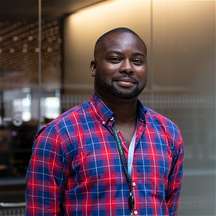
About 19 years ago, I went to a career fair at university. Bloomberg was there, and they showed me this amazing screen where you could see the price history and performance of any publicly traded company. You could then zoom in to a specific point in time and find news articles that impacted the company’s stock price. No other company had anything like this; it was amazing.
So, I joined the company right out of university and was part of the first cohort of the graduate training program in London, which lasted three months. It was fantastic to meet other recent graduates, build relationships, and expand my network. It was also an amazing learning opportunity. I started working with the Auto-Execution Systems team, then moved to Tradebook, and subsequently worked in a number of other teams and departments. I’ve also had the opportunity to build new teams in New York and London.
Today, I work in our Engineering Platform, Infrastructure, and Common Services (EPICS) group. This group is responsible for building the core systems used by Bloomberg’s 7,000+ software engineers. It’s a huge responsibility, as we’re responsible for the infrastructure that enables Bloomberg’s products to be built.
One of my teams is working on an exciting project, the Entity Relationship Manager, to provide the technology to connect all of the various data sets within Bloomberg in order to facilitate query systems, such as Bloomberg Query Language (BQL), to answer complex cross-domain questions.
Describe a typical day of work.
My goal is to always start my day early, with a light breakfast to get me going. I typically spend an hour during breakfast responding to emails, reviewing code or design documents, and prepping for the rest of my day. That is usually followed by standup with my team, and the next few hours whizz by very quickly in design meetings, interviewing, or catching up with our product stakeholders.
My team usually has lunch together, especially on the days we are all in the office. It’s great to spend that time together and get to know each other just a little bit more. The rest of my afternoon usually involves project-specific standups or meetings with our NY teams to sync up during our overlapping hours. There are also Tech Talk sessions, as well as wider group knowledge sharing meetings to look forward to and learn something new (and often something amazing).
I view career growth and development through the lens of taking on more responsibility and providing increasing value to the organization. Internal mobility, which is hugely encouraged, is a path I have taken to developing my career. This has provided me with opportunities to invest in myself and learn about different product domains and technologies. Internal mobility also really allows a wealth of knowledge and best practices to cross-pollinate across the organization. As I look across our organisation, I see opportunities with wholly new challenges to solve and new products to build. It is a path I see myself continuing to walk as I look to grow and take on additional responsibility.
Your ideas are very important and can actually make a difference. While you’re starting off with less experience than other engineers, you still bring a unique perspective. It’s important to speak up and make sure your ideas are heard because they can actually make a difference.
In addition, find someone early on in your career who can understand your strengths and weaknesses; someone you can be honest and vulnerable with. That person can help you grow, maximize your strengths, accelerate your career, and point out your blind spots so you can have maximum impact and grow both personally and professionally.